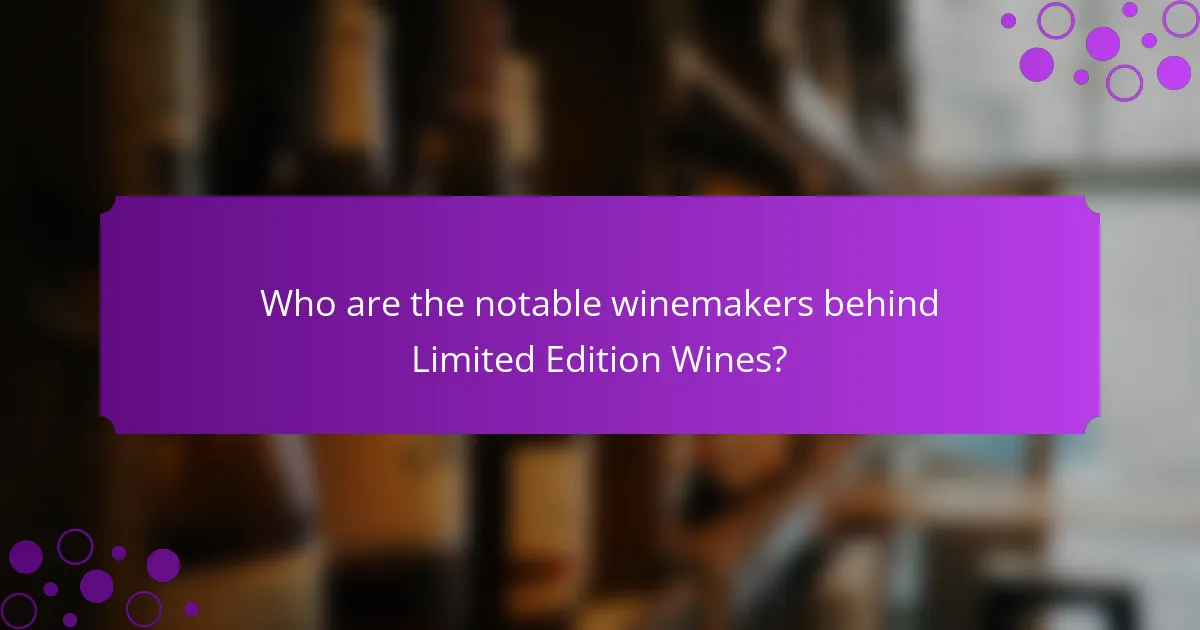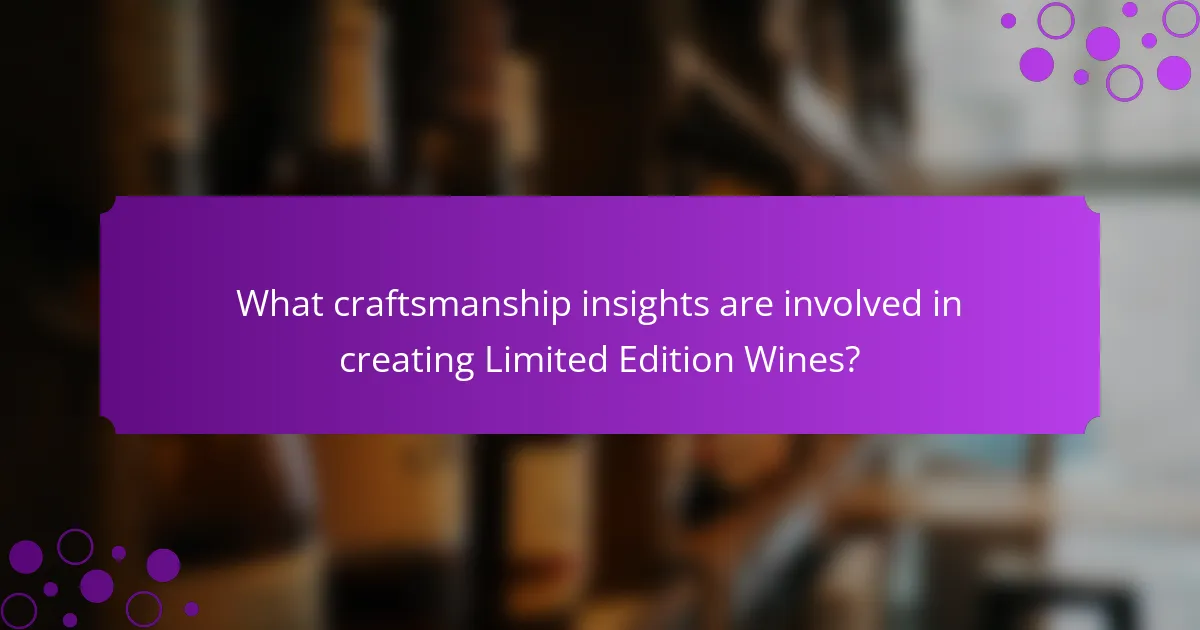
What is Limited Edition Wine?
Limited edition wine is a unique wine produced in a restricted quantity. This type of wine often reflects specific vintages, regions, or winemaking techniques. Limited editions are typically released to celebrate special occasions or milestones. They may feature distinctive packaging or labeling to highlight their exclusivity. The production volume is usually lower than standard offerings, enhancing their rarity. Collectors and enthusiasts often seek these wines for their unique qualities. Limited edition wines can also appreciate in value over time, making them attractive investments.
How is Limited Edition Wine different from regular wine?
Limited Edition Wine is distinct from regular wine primarily due to its limited production and unique characteristics. Limited Edition Wines are often crafted in smaller quantities, making them rarer and more exclusive. This exclusivity can enhance their perceived value among collectors and enthusiasts.
Regular wines are typically produced in larger volumes and are widely available. Limited Edition Wines may feature unique blends, special aging processes, or distinctive varietals not found in regular offerings.
For example, a winery might release a Limited Edition Wine to celebrate a milestone or to showcase a particular vintage. These wines often come with detailed labeling that highlights their unique attributes and production story.
The limited availability and special attributes often lead to higher prices for Limited Edition Wines compared to regular wines.
What criteria define a wine as limited edition?
A wine is defined as limited edition based on its production quantity, unique characteristics, and specific release conditions. Typically, a limited edition wine is produced in small batches. This limited production often ranges from a few hundred to a few thousand bottles. The unique characteristics may include special grape varietals, distinct aging processes, or exceptional terroir. Additionally, limited edition wines are often released to commemorate special events or milestones. These wines may also feature unique packaging or labeling to distinguish them from regular offerings. The exclusivity of limited edition wines often enhances their appeal and market value.
Why do winemakers create limited edition wines?
Winemakers create limited edition wines to showcase unique characteristics and craftsmanship. These wines often reflect specific vintages, terroirs, or innovative techniques. Limited editions generate exclusivity and appeal to collectors. They can also command higher prices due to their rarity. This practice allows winemakers to express creativity and push boundaries. Furthermore, limited editions can enhance a winery’s reputation and brand identity. Many consumers seek these wines for their distinct flavors and stories. Overall, creating limited edition wines is a strategic approach to engage enthusiasts and elevate the winemaking experience.
What are the key characteristics of Limited Edition Wine?
Limited Edition Wine is characterized by its exclusivity, unique flavor profiles, and limited production. These wines are often produced in small quantities, making them rare and sought after. The winemaking process may involve special techniques or unique grape varieties. Limited Edition Wines often come with distinctive packaging or labeling that highlights their special status. They may also have a specific vintage that reflects exceptional growing conditions. Additionally, these wines are frequently crafted by renowned winemakers, enhancing their prestige. The combination of rarity and craftsmanship often results in higher market value.
How does the terroir influence Limited Edition Wine?
Terroir significantly influences Limited Edition Wine by shaping its flavor profile and character. Terroir encompasses the unique environmental conditions of a vineyard, including soil composition, climate, and topography. These factors affect grape growth and ripening, leading to distinct taste characteristics. For example, wines from cooler climates often exhibit higher acidity and lighter body. In contrast, warmer regions may produce fuller-bodied wines with more fruit-forward flavors. Limited Edition Wines often highlight specific terroirs to create exclusive offerings. This focus on terroir can enhance the wine’s complexity and uniqueness. Notably, renowned wine regions like Bordeaux and Napa Valley are celebrated for their terroir-driven wines. The distinct attributes of these regions contribute to the high demand for Limited Edition Wines, making them sought after by collectors and connoisseurs.
What role do grape varieties play in Limited Edition wines?
Grape varieties are crucial in defining the character and quality of Limited Edition wines. Each grape variety imparts unique flavors, aromas, and textures. For instance, Cabernet Sauvignon is known for its bold tannins and dark fruit notes. In contrast, Pinot Noir is celebrated for its delicate, nuanced profile. Limited Edition wines often showcase rare or exceptional grape varieties. This rarity elevates their exclusivity and appeal. Winemakers select specific varieties to create distinct expressions of terroir. The choice of grape can influence aging potential and overall complexity. Ultimately, grape varieties play a central role in the craftsmanship and uniqueness of Limited Edition wines.

Who are the notable winemakers behind Limited Edition Wines?
Notable winemakers behind Limited Edition Wines include renowned figures such as Paul Hobbs, Philippe Melka, and Helen Keplinger. Paul Hobbs is celebrated for his exceptional Cabernet Sauvignon and Chardonnay. Philippe Melka has a reputation for crafting high-quality Bordeaux blends. Helen Keplinger is known for her expertise in Rhône varietals. These winemakers are recognized for their innovative techniques and commitment to quality. Their wines often receive high ratings from critics and wine enthusiasts alike. Each winemaker brings a unique style and vision to their limited edition releases. Their contributions significantly impact the prestige of limited edition wines.
What makes a winemaker’s profile significant in the context of Limited Edition Wines?
A winemaker’s profile is significant in the context of Limited Edition Wines because it reflects their expertise and unique approach to crafting wine. The profile includes their education, experience, and philosophy toward winemaking. This information helps consumers understand the quality and style of the wine. Limited Edition Wines often showcase the winemaker’s personal touch and creativity. For instance, a winemaker with a history of innovative techniques may produce wines that stand out in flavor and complexity. Additionally, the winemaker’s reputation can influence market demand and pricing. A well-regarded winemaker can elevate a wine’s status, making it more desirable among collectors. Therefore, the winemaker’s profile is crucial in establishing authenticity and value in Limited Edition Wines.
How do winemaker philosophies affect the crafting of Limited Edition Wines?
Winemaker philosophies significantly influence the crafting of Limited Edition Wines. These philosophies shape decisions regarding grape selection, fermentation techniques, and aging processes. For instance, a winemaker who prioritizes terroir may focus on showcasing the unique characteristics of a specific vineyard. This approach often results in wines that reflect the distinct environment in which the grapes are grown.
Additionally, winemakers may adopt minimalist or interventionist practices based on their beliefs. Minimalist winemakers often use fewer additives and allow natural fermentation processes. This can lead to wines that are more expressive of their origins. Conversely, interventionist winemakers may employ techniques to enhance flavors and structure, resulting in a different style of Limited Edition Wines.
The choice of aging vessels also reflects these philosophies. Some winemakers prefer oak barrels for complexity, while others may use stainless steel to preserve fruit purity. Furthermore, the philosophy may dictate the desired aging potential of the wine, affecting how long it is cellared before release.
Ultimately, these philosophies create a diverse range of Limited Edition Wines, each with its own story and character. The alignment of a winemaker’s philosophy with their craftsmanship results in unique offerings that appeal to collectors and connoisseurs.
What are some renowned winemakers known for their Limited Edition offerings?
Renowned winemakers known for their Limited Edition offerings include Opus One, Penfolds, and Château Margaux. Opus One, a collaboration between Robert Mondavi and Baron Philippe de Rothschild, produces exclusive vintages that often sell out quickly. Penfolds, an iconic Australian winery, is celebrated for its Grange label, which releases limited quantities of exceptional wines. Château Margaux, a prestigious Bordeaux estate, is famous for its rare and sought-after vintages, often commanding high prices at auctions. Each of these winemakers is recognized for their commitment to quality and craftsmanship in creating unique, limited releases.
How do winemakers select grapes for Limited Edition Wines?
Winemakers select grapes for Limited Edition Wines based on specific criteria. They often seek high-quality grapes from select vineyards. Factors include terroir, climate, and grape variety. Winemakers evaluate the grapes’ flavor profile and ripeness. They may also consider historical performance of specific vineyards. Limited Edition Wines typically feature unique attributes that set them apart. This selection process ensures a distinctive taste experience. The focus is on crafting exceptional wines that reflect the winemaker’s vision.
What factors influence grape selection for these exclusive wines?
Grape selection for exclusive wines is influenced by several key factors. Terroir plays a significant role, encompassing climate, soil type, and topography. Each of these elements affects the grape’s flavor profile and growth conditions. Winemakers often prioritize specific grape varieties known for their quality and unique characteristics. The ripeness of grapes at harvest time is critical, as it determines sugar levels and acidity. Additionally, winemakers consider the intended style and complexity of the wine. Historical practices and regional regulations can also dictate grape selection. For instance, certain regions may have restrictions on grape varieties allowed for specific wine classifications. Overall, these factors collectively shape the quality and exclusivity of the final wine product.
How does vintage impact the quality of Limited Edition wines?
Vintage significantly impacts the quality of Limited Edition wines. Each vintage reflects the specific climatic conditions during the growing season. Factors such as temperature, rainfall, and sunlight influence grape development. A favorable vintage can lead to grapes with optimal ripeness and flavor concentration. Conversely, an unfavorable vintage may result in lower quality grapes. Historical data supports this; for instance, the 2010 Bordeaux vintage is widely regarded as exceptional. This vintage produced wines that are still celebrated for their complexity and aging potential. Thus, vintage serves as a critical determinant of quality in Limited Edition wines.

What craftsmanship insights are involved in creating Limited Edition Wines?
Creating Limited Edition Wines involves meticulous craftsmanship. Winemakers select premium grapes from specific vineyards. They often use traditional techniques for fermentation and aging. This includes barrel aging in high-quality oak. Limited production runs enhance exclusivity and quality. Each bottle is often hand-labeled and numbered. This attention to detail reflects the winemaker’s artistry. Limited Edition Wines frequently showcase unique flavor profiles. These insights contribute to their desirability among collectors.
What techniques do winemakers use to enhance Limited Edition Wines?
Winemakers enhance Limited Edition Wines through various techniques. These techniques include selective grape sourcing, which involves choosing high-quality grapes from specific vineyards. They also employ extended aging processes in premium oak barrels. This aging adds complexity and depth to the wine’s flavor profile. Additionally, winemakers may use micro-oxygenation to soften tannins and enhance mouthfeel. Blending different varietals is another technique to achieve a unique taste. Some winemakers also practice meticulous vineyard management to optimize grape quality. These methods contribute to the exclusivity and superior quality of Limited Edition Wines.
How does barrel aging affect the flavor profile of Limited Edition Wines?
Barrel aging enhances the flavor profile of Limited Edition Wines significantly. It introduces complex flavors such as vanilla, spice, and toasted oak. These flavors come from the interaction between the wine and the wood of the barrel. The aging process also softens tannins, resulting in a smoother mouthfeel. Oxygen permeates through the barrel, allowing for micro-oxidation. This process can deepen color and enhance aromatic qualities. Research shows that wines aged in oak barrels can develop more nuanced profiles compared to those aged in stainless steel. The specific type of wood and toasting level further influence the final taste.
What innovative practices are being adopted in the production of Limited Edition Wines?
Innovative practices in the production of Limited Edition Wines include the use of advanced technology and sustainable methods. Winemakers are adopting precision viticulture to monitor vineyard conditions in real-time. This allows for tailored interventions that enhance grape quality. Additionally, many producers are incorporating fermentation techniques that utilize wild yeast. This practice can add unique flavors to the wine. Some wineries are experimenting with alternative aging vessels, such as concrete eggs or amphorae. These vessels can impart distinct characteristics to the wine. Furthermore, limited edition releases often feature unique blends or single vineyard selections. This approach highlights the specific terroir and vintage characteristics. The use of augmented reality labels is also emerging, providing consumers with interactive experiences. These innovations reflect a commitment to both quality and consumer engagement.
How is the packaging of Limited Edition Wines designed to reflect their exclusivity?
The packaging of Limited Edition Wines is designed to reflect their exclusivity through premium materials and unique design elements. High-quality glass bottles are often used, featuring thicker walls and intricate shapes. Labels are typically crafted from luxurious paper with special finishes like embossing or foil stamping. These elements create a tactile experience that emphasizes rarity. Limited run numbers are often printed on the label, enhancing the sense of scarcity. Additionally, some wines are packaged in custom boxes or wooden cases, further elevating their presentation. This thoughtful design approach communicates the wine’s unique status and craftsmanship.
What materials and designs are commonly used for Limited Edition Wine bottles?
Limited Edition Wine bottles commonly use glass, metal, and wood as materials. Glass is the primary choice due to its ability to preserve wine quality. Many limited editions feature unique bottle shapes to enhance visual appeal. Metal capsules are often used for sealing, adding a premium touch. Some bottles incorporate decorative labels made from high-quality paper or foil. Wood boxes or cases are frequently used for packaging, enhancing the presentation. These design elements often reflect the wine’s exclusivity and craftsmanship. Collectors value these features for their aesthetic and functional attributes.
How does packaging influence consumer perception of Limited Edition Wines?
Packaging significantly influences consumer perception of Limited Edition Wines. Attractive packaging creates an impression of quality and exclusivity. Unique designs and premium materials enhance the perceived value of the wine. Research shows that consumers are willing to pay more for wines with visually appealing packaging. A study published in the Journal of Wine Economics found that packaging design affects taste expectations. Consumers often associate ornate labels with higher quality. Limited Edition Wines with distinctive packaging stand out on shelves. This differentiation can lead to increased sales and brand loyalty.
What are some tips for selecting and enjoying Limited Edition Wines?
Select Limited Edition Wines by researching the winemaker’s reputation and the wine’s unique attributes. Look for wines with limited production runs, as they often indicate quality and exclusivity. Check for reviews and ratings from reputable sources, which can guide your selection. Consider the wine’s vintage, as certain years yield better quality due to optimal growing conditions. Pay attention to the grape variety and region, as these factors influence flavor profiles. When enjoying the wine, use appropriate glassware to enhance aromas and taste. Allow the wine to breathe before tasting, which can improve its overall flavor. Pair the wine with complementary foods to elevate the experience.
How should Limited Edition Wines be stored for optimal enjoyment?
Limited Edition Wines should be stored in a cool, dark place to maintain their quality. Ideal storage temperatures range from 50°F to 55°F. Fluctuations in temperature can damage the wine’s integrity. Humidity levels should be around 70% to keep corks from drying out. Wines should be stored horizontally to keep the cork moist. This prevents oxidation and spoilage. Light exposure can degrade wine, so avoid direct sunlight. Additionally, vibrations can disturb sediments in the wine. A stable environment ensures optimal aging and enjoyment.
What food pairings work best with Limited Edition Wines?
Limited Edition Wines pair best with gourmet dishes that enhance their unique characteristics. Rich meats like lamb or beef complement bold red wines. Seafood, especially grilled fish, pairs well with crisp white wines. Aged cheeses can elevate both red and white varieties. Dishes with earthy flavors, such as mushroom risotto, also match well. Spicy foods can enhance aromatic wines, creating a balanced experience. These pairings are supported by wine and food pairing studies emphasizing complementary flavors.
Limited Edition Wine is a unique category of wine produced in restricted quantities, often reflecting specific vintages, regions, or winemaking techniques. This article explores the characteristics that distinguish Limited Edition Wines from regular offerings, including their exclusivity, unique flavor profiles, and the craftsmanship involved in their creation. It highlights the significance of terroir, grape selection, and winemaker philosophies, as well as the innovative practices and packaging that enhance their appeal. Additionally, notable winemakers known for their Limited Edition offerings are discussed, providing insights into the artistry and investment potential of these exclusive wines.